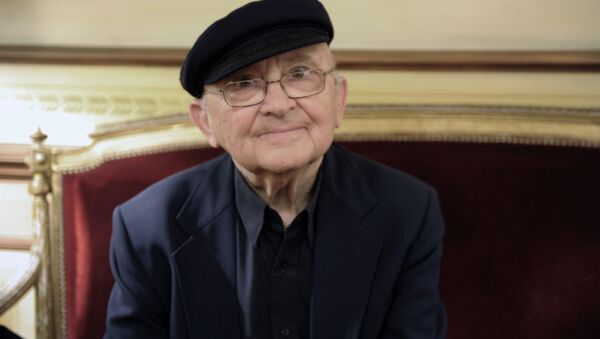Prominent Israeli author, a Holocaust survivor, passed away Thursday morning at Beilinson hospital near Tel Aviv, Israeli public radio reported.
Appelfeld was born in a village near the then Romanian city of Czernowitz, in present-day Ukraine. His mother was a victim of the Nazi persecution of Jews, and at the age of eight he was sent to a concentration camp with his father. In 1942, he escaped and hid in the woods, where “a gang of Ukrainian criminals” found and adopted him.
His recruitment to the Red Army as a kitchen orderly paved the way for his moving to Europe, and subsequent departure to Palestine. In an interview to AFP, he described himself as “small, lean and speechless,” having no knowledge of Hebrew.
"No one wanted orphans in Europe. The only place we could go was Palestine," he told AFP.
Subsequently, he learned Hebrew, studied literature at Jerusalem’s Hebrew University and became a professor of Hebrew literature at Ben Gurion University.
“Naïvely I believed that action would silence my memories, and I would flourish like the natives, free of the Jewish nightmare, but what could I do?” he told his friend, an American writer, Philip Roth. “The need, you might say the necessity, to be faithful to myself and to my childhood memories made me a distant, contemplative person. My contemplation brought me back to the region where I was born and where my parents’ home stood. That is my spiritual history, and it is from there that I spin the threads.”
Having won the most prestigious awards for his novels and poetry, he was considered by many one of the greatest writers of the 20th century. The critic Irving Howe called one of his most famous novels, “Badenheim 1939,” “a small masterpiece.” Appelfeld wrote books in Hebrew nearly every couple of years, with 16 novels translated into English from 1981 to 2011.
"He is the Kafka of the second half of the (20th) century," Appelfeld’s literary editor told Israeli army radio.
While Philip Roth called him “fiction’s foremost chronicler of the Holocaust,” Appelfeld refused to be associated with the extermination of Jews and did not identify himself as a Holocaust author.
"You cannot be a writer of death. Writing means you're alive," he said.
In his interview with Roth, published in The New York Times Book Review in 1988, Appelfeld said that the Holocaust was “the type of enormous experience that reduces one to silence” because “the wound is too deep and bandages won’t help, not even a bandage such as the Jewish state.”
The winner of the Israel Prize in 1983 and France's Prix Medicis literary award for best foreign book in 2004 for his 1999 autobiography "Story of a Life" confessed that his books were popular not among the Holocaust survivors, who were “afraid to be confronted with their past,” but among their children.
“Until now, those parents are still afraid to touch my books, and it’s very moving to see because there was such a deep gap between parents and children,” he said in a revealing interview for The Times in 1992. “Somehow my books have helped to cross the gap.”




